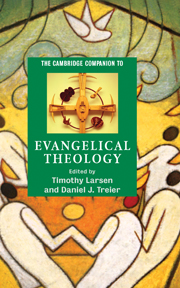Book contents
- Frontmatter
- 1 Defining and locating evangelicalism
- Part I: Evangelicals and Christian doctrine
- Part II: The contexts of evangelical theology
- 10 Evangelical theology and culture
- 11 Evangelical theology and gender
- 12 Race and the experience of death: theologically reappraising American evangelicalism
- 13 Evangelical theology and the religions
- 14 Evangelical theology in African contexts
- 15 Evangelical theology in Asian contexts
- 16 British (and European) evangelical theologies
- 17 Evangelical theology in Latin American contexts
- 18 Evangelical theology in North American contexts
- Index
18 - Evangelical theology in North American contexts
from Part II: - The contexts of evangelical theology
Published online by Cambridge University Press: 28 September 2007
- Frontmatter
- 1 Defining and locating evangelicalism
- Part I: Evangelicals and Christian doctrine
- Part II: The contexts of evangelical theology
- 10 Evangelical theology and culture
- 11 Evangelical theology and gender
- 12 Race and the experience of death: theologically reappraising American evangelicalism
- 13 Evangelical theology and the religions
- 14 Evangelical theology in African contexts
- 15 Evangelical theology in Asian contexts
- 16 British (and European) evangelical theologies
- 17 Evangelical theology in Latin American contexts
- 18 Evangelical theology in North American contexts
- Index
Summary
In July 2000, some 10,000 evangelists, theologians, mission strategists, and church leaders from more than 200 countries - more than belonged to the United Nations at the time - came together in Amsterdam at the invitation of Billy Graham to renew their commitment and formulate new strategies for world evangelization in the twenty-first century. The theologians' track at this meeting was chaired by James I. Packer, a British theologian based in North America, whose writings had been translated into many languages and whose influence was widely recognized throughout the world evangelical movement. This gathering produced a theological statement, the Amsterdam Declaration, which defined Christian theology as “the task of careful thinking and ordering of life in the presence of the triune God,” and also asserted that “theologians can help to clarify and safeguard God's revealed truth” by “providing resources for the training of evangelists and the grounding of new believers in the faith.”
Amsterdam 2000, as this conference was called, was a mosaic of global, transdenominational evangelicalism, a religious current identified by Wolfhart Pannenberg as one of three (along with Orthodoxy and Roman Catholicism) vital, ascendant forces within the world Christian movement. The four preceding chapters in this book explore the distinctive voice of evangelical theology as it has emerged in its African, Asian, European, and Latin American contexts. Our purpose here is to review some of the major issues, themes, and leaders that have shaped evangelical theology in North America. Perhaps this chapter will also allow readers of the whole volume to evaluate the degree to which North American evangelicalism is or is not like evangelicalism in other parts of the world and also the degree to which North American evangelicalism does or does not set the tone for discussions and practice in other parts of the world.
- Type
- Chapter
- Information
- The Cambridge Companion to Evangelical Theology , pp. 275 - 292Publisher: Cambridge University PressPrint publication year: 2007
- 1
- Cited by



